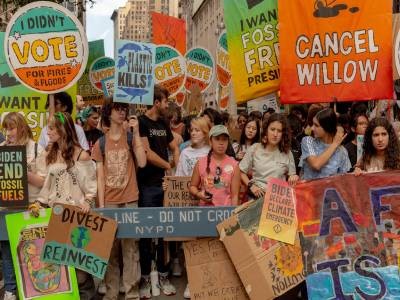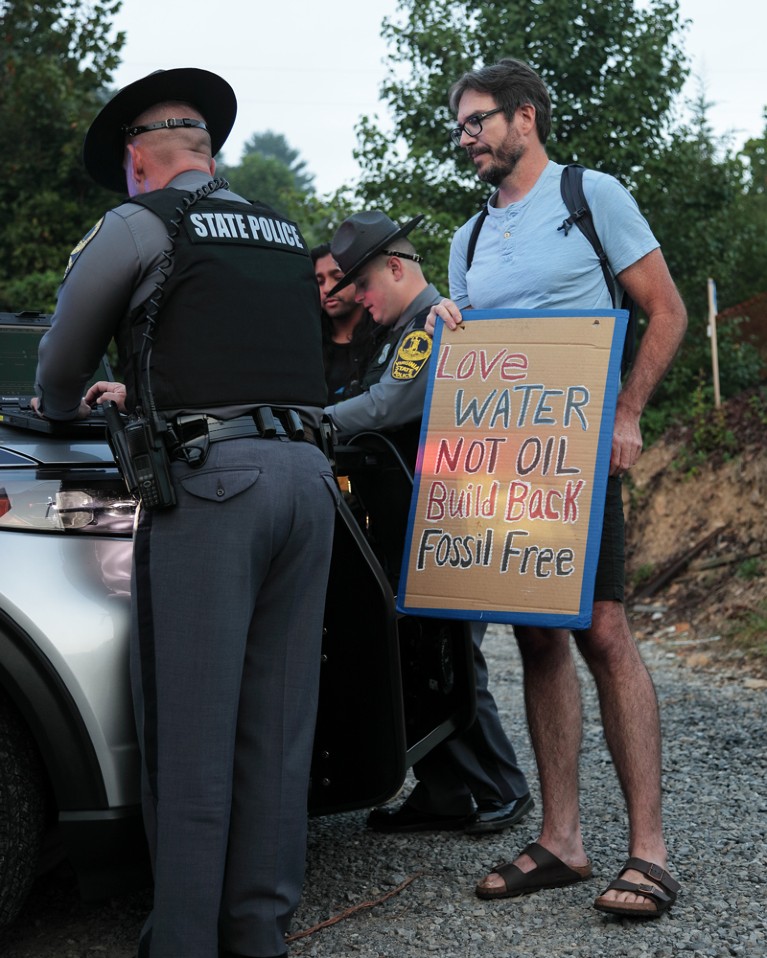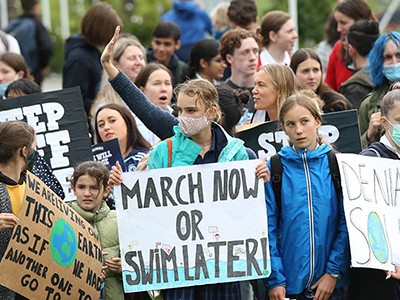Climate scientist Peter Kalmus is freaked out. And he thinks everyone should be just as alarmed as he is over the state of the planet.
When he was a graduate student in 2006, Kalmus was studying astrophysics and says he was “blissfully ignorant” about the dangers of climate change. But then he learnt how the greenhouse effect worked — how carbon dioxide pollution from the use of fossil fuels is effectively trapping heat in the atmosphere and warming the planet at an accelerating pace.
Over time, Kalmus was plagued by the increasing certainty that, “if we continue burning fossil fuels at this pace, that will render large parts of the planet uninhabitable”. By 2012, he had abandoned his budding career in astrophysics to pursue work at NASA’s Jet Propulsion Laboratory in Pasadena, California, on the impact of intensifying temperatures on humans and other species.
Kalmus became worried that the accumulation of evidence was not leading the world to necessary action. “Policymakers in general are not responding appropriately to the science that we’ve been giving them.” Hence the freak out. (Kalmus stresses that his views are his own, not NASA’s.)

How effective are climate protests at swaying policy — and what could make a difference?
He decided he needed to do more to confront the problem. On 6 April 2022, Kalmus, two other scientists and an engineer blockaded a Los Angeles branch of JP Morgan Chase, an investment banking firm that invests heavily in fossil-fuel extraction. “I’m willing to take a risk for this gorgeous planet and my son,” he said to a small crowd and in a video posted on Facebook, earning himself some 700,000 page views. He was arrested for trespassing. The protest was part of a global effort that day by members of the international environmentalist group Scientist Rebellion, which claims the event was “the largest civil disobedience campaign by scientists in history”.
Researchers are noticing a rising tide of anger and action by climate scientists such as Kalmus, who are frustrated that ever-more dire forecasts and extreme events related to climate change aren’t provoking an effective response. They are “increasingly becoming aware that while science is necessary for moving towards policy-making, it is insufficient to get to policy-making on its own, and science cannot create political will”, said Dana Fisher, a sociologist at American University in Washington DC. Her book, Saving Ourselves: From Climate Shocks to Climate Action, which was published earlier this month, argues that this evergrowing group has become a ‘radical flank’ of concerned climate scientists who are doing things such as vandalizing art work, blocking entrances to buildings and interrupting traffic.
These scientists are, she says, “getting blue in the face trying to use the normal channels through which we usually express how our science has relevance to the world”.
Eighty hours on a train
Table of Contents
Early last December, a train pulled slowly out of Boston’s South Station. In the dining car, earth scientist Rose Abramoff was starting an 80-hour cross-country train ride to the 2023 conference of the American Geophysical Union (AGU) in San Francisco, California. Out of concern for her carbon footprint, Abramoff no longer flies even if, as with this trip, the ground journey takes ten times as long and costs more. I joined her for the first leg of the trip.
The lengthy journey gave her a lot of time to think about what happened a year before at the previous AGU annual meeting. At the very start of the conference, in a giant lecture hall, she and Kalmus leapt onto the stage and unfurled a banner for Scientist Rebellion. Kalmus yelled, “As scientists we have tremendous leverage, but we need to use it.” Abramoff pleaded, “Please. Please. Find a way to take action.”
As they had anticipated, an official escorted them out of the hall. Their protest lasted all of 30 seconds. The AGU also confiscated their conference badges and officially expelled them from the rest of the meeting — a reaction that Abramoff says felt extreme. “Being asked to leave the session would have been a reasonable response,” Abramoff said during the train ride, sounding bitter. More than 2,000 researchers urged the AGU to reverse its sanctions on Abramoff and Kalmus.

Climate scientist Peter Kalmus looks on as Virginia state police officers enter his information on a computer.Credit: William Dickson
That wasn’t the only consequence for Abramoff, who was then an associate scientist at Oak Ridge National Laboratory in Tennessee. Alerted of the event, Oak Ridge fired her. In her termination letter, she was accused of the “misuse of government resources” and of violating the “Code of Business Ethics and Conduct”. She says, in her defence, that her government work at the conference that week was finished by the time she took to the stage, and so the protest was done in her free time. (Kalmus did not lose his position, although Jet Propulsion Laboratory officials issued him a warning.)
A year later, in 2023, Abramoff, who now continues her research as an independent researcher in Maine, and Kalmus were again at the AGU conference (Kalmus joined remotely). But this time, the AGU ran four official sessions on climate activism and grief over climate change. In an e-mail to Nature, an AGU press officer said that removing Abramoff and Kalmus from the 2022 meeting was appropriate, citing the organization’s code of conduct. After the incident, the “AGU doubled down on making members aware of new opportunities”, such as activism. The AGU also stressed the need for civility, which rules out disrupting meeting sessions.

Young people’s climate anxiety revealed in landmark survey
Abramoff studied biology and dance for her undergraduate degree and then earned a PhD in ecology. Her political awakening occurred in 2019, while peer-reviewing several chapters of the latest report of the Intergovernmental Panel on Climate Change (IPCC). She had never before focused so intently on the effects that the climate crisis has had on the planet and its inhabitants. “In every single system is evidence of fundamental major breakdown that has implications for human health, for ecosystem services.” The document’s style, she says, betrayed no sense of existential urgency of the dangers at hand. “My job can’t just be to calmly document the end of the world.”
While talking about that experience on the train, Abramoff welled up and wiped away a tear. It’s the third time in eight months that a climate scientist or climate negotiator has choked up during an interview with me, something I haven’t witnessed before in my 25 years of climate reporting.
After working on the IPCC report, Abramoff decided that she needed to take more concrete action. On 6 April 2022, she chained herself to the White House fences during a climate protest. She was arrested on the same day that Kalmus was arrested on the other side of the continent. There were news stories, with pictures of her dressed in a white lab coat. She draws on her background as a performer during protests. “The types of things that get media attention are a little theatrical and visually interesting.”
Since her arrest two years ago, Abramoff has blockaded banks and the White House Correspondents’ Dinner, glued herself to a fence at a private jet terminal, occupied a state Capitol building and tried to shut down the construction of a natural-gas pipeline. Seven of her 14 actions have led to arrests.
Political awakening
Although Abramoff’s activist rap sheet is an outlier among scientists, many researchers agree with her that the climate crisis needs an urgent response. A survey conducted last year of 9,220 researchers around the world, from a range of scientific and academic disciplines, found that more than 90% agree that “fundamental changes to social, political, and economic systems” are needed1. Fabian Dablander, one of three postdoctoral researchers at University of Amsterdam and Maastricht University in the Netherlands who led the research, says its the largest of only three global surveys that he is aware of regarding scientists’ attitudes on climate.
The study, which has not yet been peer reviewed, surveyed researchers in 115 countries who had authored papers in 545 leading peer-reviewed journals between 2020 and 2022. Dablander cautions that the results are probably biased in favour of the concerned scientists, because they would be the most motivated to fill out the survey, which was sent to almost 250,000 authors. “I’m not sure how big this bias is exactly,” he says.

Earth scientist Rose Abramoff chained to a White House fence during a climate protest.Credit: William Dickson
Overall, 78% of the respondents had discussed climate change with someone other than a colleague; 29% had engaged in climate advocacy, 23% had joined legal protests and 10% — nearly 900 scientists — had engaged in civil disobedience.
Political engagement varied by discipline and country. Scientists in Oceania were more likely to take civic actions (such as joining a climate protest). Europe and North America are virtually tied for second place. Scientists in Asia were least likely to engage in most of the civic actions included in the survey, Dablander found.
A follow-up analysis of the survey data shows that scientists who were involved ‘a great deal’ in climate research were about 2.5 times more likely (37% of participants) to have joined protests, and at least 4 times more likely (18% of participants) to have engaged in civil disobedience than were non-climate researchers2.
Another survey also found high levels of engagement among climate researchers. In a 2021 study of 1,100 climate scientists, 90% had participated in at least one form of public engagement on climate issues, including doing press interviews, briefing policymakers and being active on social media over the past year3.
Viktoria Cologna, the lead author of the survey, says that long-held taboos against political participation by scientists on climate issues are waning. Cologna, a postdoctoral researcher at the University of Zurich in Switzerland, has previously been a member of Scientists for Future, the scientists’ wing of Fridays for the Future, which is a global student movement inspired by environmental activist Greta Thunberg. “I definitely see — also in my own circles, both within social science and natural science circles — that scientists are becoming more vocal; they are joining more protests,” she says.

Young people’s climate anxiety revealed in landmark survey
In the past, many scientists worried that they would lose credibility by taking political stances. But Cologna didn’t find that to be true in her study, which also surveyed 884 members of the public in the United States and Germany. She and her co-authors reported that 70% of Germans and 74% of Americans approve of scientists advocating for climate-related policies.
The survey of researchers also uncovered hints that people who engage in advocacy do not lose the respect of their colleagues. It found that 73% of German climate scientists and 59% of US climate scientists agree that people in their field should “actively advocate for specific climate-related policies”.
A similar finding emerged from a 2020 survey about political engagement of 2,208 members of the US Union of Concerned Scientists (UCS). Less than 6% of respondents thought that scientists should ‘rarely’ or ‘never’ be politically active. Fernando Tormos-Aponte, a sociologist at the University of Pittsburgh in Pennsylvania who led the team that conducted the study, says that a cohort of scientists became politicized by policies widely seen as anti-scientific during the administration of former US president Donald Trump. These scientists continued their activism even when Trump left office. “The thing that persists is climate. There’s a sense of urgency around that, that’s almost unparallel to any other issue.”
Greta Dargie, a geographer at the University of Leeds, UK, is one of many climate researchers who have ramped up their activism in the past few years. Last year she was arrested, for the first time in her life, for deliberately blocking traffic in London at an event organized by the British environmental activist group Just Stop Oil. Then, in the same week, she was arrested again, for the same offence.
Some researchers worry that the more extreme forms of activism can have negative consequences. Jörg Geldmacher, a geochemist at the GEOMAR Helmholtz Centre for Ocean Research Kiel in Germany, says he doesn’t take part in more aggressive actions, such as vandalizing buildings, because they could be counterproductive. “If the masses are against it, because of these extreme activities, then I don’t know if that is very helpful for the movement,” he says.
Instead, he is an active member of the German branch of Scientists for Future. Geldmacher joins legal demonstrations frequently, attends monthly meetings that send ideas to local politicians for conserving energy and often speaks at schools and to the general public about the climate crisis.
Climate grief
Halfway through the 2023 AGU gathering in San Francisco, I saw Abramoff again, this time in a crowd at the Chieftain Irish Pub. She had just come from the ‘climate grief circle’, an officially approved event that she and Kalmus had organized. A few dozen researchers sat in several intimate groups and discussed their feelings about confronting the deterioration of Earth’s systems each day and, for some, the fears they couldn’t share with their children. On the train, Abramoff had said that these circles serve both as group therapy and as motivation. “It’s extremely calming and fortifying,” she says.
At the pub, a couple of dozen activists traded their stories and tips for organizing protests. Noah Liguori-Bills, a first-year atmospheric-science PhD student at North Carolina State University in Raleigh, received a short pep talk from Abramoff. Afterwards he said that this was his first scientific conference, and that he hadn’t expected to meet any radicals. But then he stumbled on an unsanctioned guerrilla-theatre performance on the pavement right outside the conference. It promoted one of the official activist events. The mixer at the pub is “definitely one of the most exciting things I’ve done here”, he says. “I’m really impressed with how committed everyone is.”
Liguori-Bills says he expects to join a branch of Scientist Rebellion when he goes home. He says that it’s unlikely that he’ll face serious consequences, such as what happened to Abramoff. But he’s willing to take the risk. “I think it’s worth it. The whole world’s at stake.”
